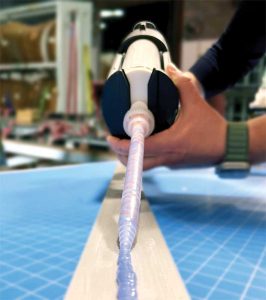
By choosing the right adhesive, signmakers can ensure their bonds are strong, durable, and long-lasting.
Measuring stress under pressure
Some additional properties which can influence read-through are the thermal expansion coefficient, modulus of elasticity and yield strength, glass transition temperature, application, and fatigue resistance.
Coefficient of thermal expansion (CTE)
This measures how much a material expands or contracts as its temperature changes. Ensuring the CTE of the substrate is similar to that of the adhesive can help eliminate stress at the bond line and significantly reduce the chance of read-through.
Modulus of elasticity and yield strength
These define how stiff or rigid a material is and how far it can be stretched. The amount of stress a material can take before becoming permanently deformed is referred to as its yield strength. If either the modulus of elasticity or the yield strength of the adhesive is too low, it may not be able to hold the substrate in place and prevent read-through.
Glass transition temperature (Tg)
This is the temperature at which a material transitions from a rigid, glassy state to a softer, more flexible state. If the Tg of the adhesive is too high, it may not be able to accommodate the thermal expansion and contraction of the substrate, leading to stress and read-through.
Application
Proper application techniques are crucial, such as using the right type of adhesive, applying it evenly, and ensuring the substrate surface is properly cleaned and prepared. Curing temperature and humidity conditions during the application process also reduce the risk of read-through.
Fatigue resistance
This refers to the ability of signage to withstand repeated stress or strain without failure. Beware of fillers which can be added to provide initial elasticity, as they can degrade over time and lead to fatigue.
Gaining understanding, not product knowledge
It is important for signmakers to be clear on the specific requirements of their projects. They should also be concerned about product capabilities, especially when trying to avoid the need to troubleshoot an application. Indeed, adhesives come with their strengths and limitations, but collaborating with an expert will help signmakers understand their bonding application, environment, materials of choice, and other stressors.
Companies should first ask their adhesive supplier about durability elongation and modulus. It is crucial to remember impact resistance is a combination of having a low modulus and an adhesive that is able to support elongation. They should also inquire about how certain products are formulated to answer adhesive rigidity issues and request a meeting with an adhesives engineer to define any bonding challenges.
Conclusion
Signmakers should not feel as if they are stuck with the first adhesive supplier they meet. A solutions specialist should come with a proven track record, specialized product knowledge, and long-standing industry partnerships. When in doubt, it is best to assume strength without flexibility means signage with a shorter life expectancy.
David Mucciarone is the vice-president of MPI Matco, a provider of adhesive solutions for a variety of industries and applications, including signs and graphics.





